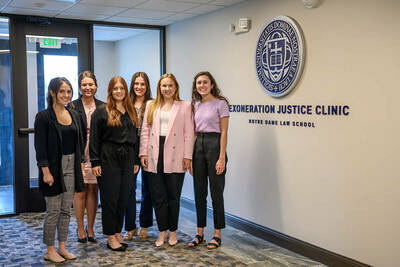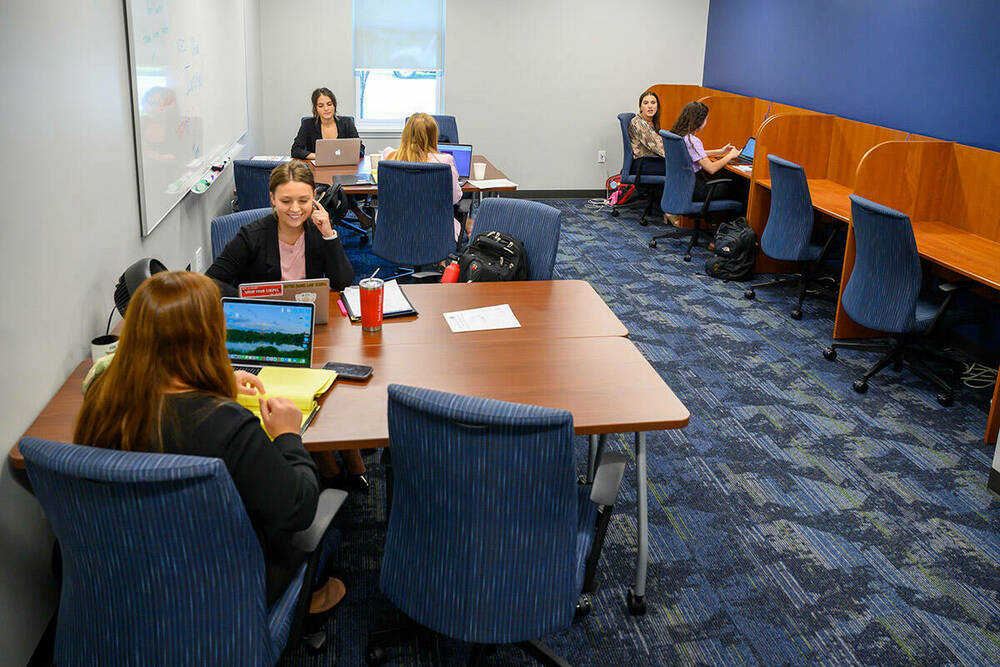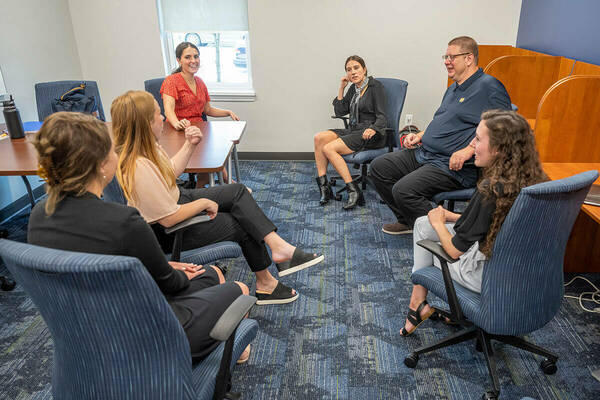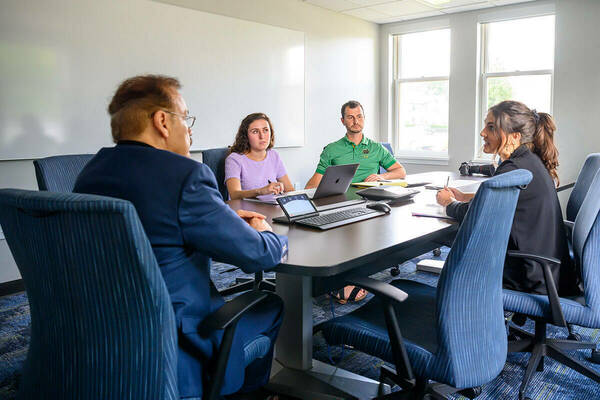Exoneration Justice Clinic’s summer interns provide valuable contributions

Notre Dame Law School’s Exoneration Justice Clinic (EJC) welcomed its first cohort of summer interns. Together, they contributed to over 50 cases for the clinic.
The intern group included three rising second-year Notre Dame Law students, and three rising undergraduate Notre Dame seniors. The six interns — law students Pirie Maher, Riley Realing, and Jennifer Sutterer, and undergraduate political science students Clare Hillen, Emily Krejci, and Morgan McLaughlin — worked in teams of two with one undergraduate student paired with one law student to form intake teams.
Jimmy Gurulé, professor of law and faculty director of the Exoneration Justice Clinic, chose the students based on high academic performance and a demonstrated passion for exoneration, criminal justice, or civil and human rights work.
Offering the internship experience to undergraduates as well as law school students gave those students an opportunity to do meaningful law-focused work, and helped solidify their intention to pursue law school. Due to their lack of legal training, Gurulé was initially unsure how well undergraduates would integrate into the clinic. However, he said, “My expectations were exceeded by miles. These students are bright, hardworking, and passionate, and made an invaluable contribution to the work of the EJC.”

The main responsibility of the interns was to help the clinic decide which cases to accept for legal representation. Guided by staff attorneys, the students examined materials submitted by each applicant-inmate to track down every potential avenue of exoneration. They also conducted independent research into the legal issues and investigated the facts of each case. At the end of the process, they prepared comprehensive recommendation memos for Gurulé and clinic’s attorneys to review.

The interns also had an opportunity to talk with a client virtually, and meet in person with the clinic’s first exonerated client, Andy Royer. The interns considered these as among the most meaningful and memorable moments of their internship.
“When I witnessed our client's graciousness and kindness to each of us, knowing that she sat confined in prison as an innocent person, I saw a perfect example of how to show love to others even when it feels like the whole world is working against you,” said second-year law student Pirie Maher.
Gurulé said that every intern described the internship as a transformative experience. “To meet clients is a powerful moment and really humanizes the work that we are doing,” said Gurulé.
In addition to intake cases, the interns conducted legal and investigative research on active Exoneration Justice Clinic cases. They reviewed court transcripts and police records and contributed to plans of action for ongoing investigations. Because their cases are at different stages of investigation, the interns received an expansive view of the overall process of building a case.

Undergraduate intern Emily Krejci, who will be a senior this year, commented, “The EJC interns received such an astoundingly well-rounded look at what it takes to investigate and litigate a petition for post-conviction relief as we were included at every stage of a case.”
Gurulé said the Exoneration Justice Clinic has received 150 requests for legal representation since its opening in the fall of 2021, with more and more inmates contacting the clinic for assistance. He said, “Our interns worked on a significant number of intake cases this summer and their assistance allowed us to review many more requests for legal assistance.”
It was such a positive experience having undergraduate students at the clinic that, in addition to several law school students enrolled in the Clinic, Gurulé plans to accept two undergraduate student interns each semester during the 2021–2022 school year.
Reflections from the Exoneration Justice Clinic interns:
Clare Hillen
Undergraduate Class of 2022
Major: Political Science and Russian
“All of the interns had the chance to speak with a current client of the clinic who has been incarcerated for over 15 years. We gave her updates on her case and upcoming hearings. During that meeting, she was also able to speak with a person who had recently been exonerated after spending several years wrongfully incarcerated. Hearing his story and words of encouragement for this client was the most rewarding experience of my time at the EJC. We know that the work we do doesn’t just have legal implications. Rather, we know that what we do every day can help change the lives of people who have been wrongfully incarcerated for years.
“When I was learning about law school and if it was the right path for me, I was really drawn to exoneration and human rights work. There are so many people who feel there is no one to speak for them and to help them, and that is why I think using the law to give people hope is important. I knew the clinic was working on not just exoneration, but helping the former inmates adjust to life outside of prison. I think it is extremely important to help the client through all stages, and I think it would be amazing to work on policy research that could reduce the chance of another person being wrongfully incarcerated.”
Emily Krejci
Undergraduate Class of 2022
Major: Political Science and Constitutional Studies
“The encouragement and support from the clinic’s attorneys were especially impactful on me. As an undergraduate we rarely get opportunities to work in the legal field and if we do they are often in positions that lack direct connection to the lawyers and the clinic or firm’s work. The internship at the EJC is entirely different. Not only have I been able to work directly with the attorneys on multiple occasions, but the work I do is appreciated and utilized. I feel that everyone at the clinic has made the effort to get to know me on a personal level and their encouragement of my skills and interests in this area of law will take me far into my career.
“I feel this area of law is so unique because it requires those working on a case to morph from investigators into litigation attorneys into brief writers and beyond. It also does not hurt that what you are fighting for is more than just one case at a time; you are fighting to build a criminal justice system that works the way it was meant to. Fighting to right the wrongs of the past is a cause everyone can get behind. This line of work truly allows attorneys and students to utilize multiple aspects of their passion for law while fighting in the name of justice.”
Pirie Maher
Second-year Law Student
“The most meaningful part of working with the EJC was an opportunity to interact with our clients. When Andy Royer and his parents visited our office after becoming the clinic’s first exoneree, we learned more about him as a person, not just as an inmate or client. We also got to virtually meet one of our clients and hearing our client’s voice and getting to put a face and personality to a story left an impact on me as it revealed that the impact we make is real and ongoing. The kind of hope I saw in our client that day is something we get to experience everyday as an EJC intern when we read letters written by potential clients.
“I became familiar with the work of the clinic through the Notre Dame Exoneration Project. Prior to law school, I watched the ‘Innocence Files’ documentary. It disturbed me to my core that the criminal justice system locks innocent people in prison not due to some procedural error, but due to police and prosecutorial misconduct, faulty forensic evidence, and ineffective assistance of defense counsel.”
Morgan McLaughlin
Undergraduate Class of 2022
Major: Political Science
“My time at the EJC has become a defining part of my Notre Dame experience, and my life as a whole. Having the opportunity to let those wrongfully convicted know that we see them as human beings and we hear them has been meaningful and rewarding. I was amazed at the grace, gratitude, and perspective of the EJC clients despite a horribly painful and unjust situation. They have inspired me to have the character and compassion that these clients possess.
“I read the book ‘Just Mercy’ by Bryan Stevenson and it filled me with an astounding sense of anger, despair, determination, and hope. Reading how Stevenson dedicates his life to defending the wrongly condemned really inspired me. It brought me back to a memory from high school where I was able to attend a murder trial and observe a man awaiting his fate. Whether guilty or innocent, I tangentially felt the power of the law in that moment. After those powerful experiences, I felt the dots connecting in the path behind me. My passions demand that I be an advocate for the marginalized, the persecuted, and the defenseless. The opportunity to intern at the EJC was the type of impactful experience I had been hoping for. I realized that the law changes lives forever, and I wanted to help bring justice to this transformation.”
Riley Realing
Second-year Law Student
“Being able to meet the current clients and the already exonerated clients was the most meaningful experience working at the EJC. It really highlighted for everyone the importance of this work. The clients' resilience and strength were truly one of the most admirable things I've ever seen--it's an honor to help them in whatever capacity we can.
“During undergrad I did an independent study under a professor whose research and focus is on the intersections between violence and poverty in the criminal justice system. I studied parenting programs in prison and had the opportunity to visit the men’s and women's prisons in my state a few times. My research regarding the implications of incarcerated parents emphasized just one component of the family trauma that both the parent and child endures, but there are countless other damaging factors—both inside and outside the family—that accompany incarceration. I then realized that being incarcerated on the basis of a wrongful conviction is an entirely new level of trauma that no one should endure.”
Jennifer Sutterer
Second-year Law Student
“It is incredibly rewarding to see the real-world impact that our work has on these individuals who unfairly suffer, many for decades, because the criminal justice system has failed them. Speaking with our clients is also extremely motivating because no one should have to go through the unimaginable horror that they are going through, and we are working to fight against that.
“I wanted to intern at the EJC because I served on the intake committee last semester, had an interest in post-conviction work, and was drawn to the mission of the clinic. I believe that our country’s criminal justice system has serious flaws and is often abused by the wealthy and powerful to the detriment of marginalized communities, low-income individuals, and those living with mental illnesses. In order to maintain their position, those who are in power will refuse to admit their own wrongdoings rather than pursue justice, especially when responsible for a wrongful conviction. I am passionate about these issues and wanted to spend my summer fighting for the powerless and correcting these miscarriages of justice. I am very grateful for this internship with the EJC and hope to use my law degree to continue helping others after graduation.”
Read more about the Law School’s Exoneration Justice Clinic at exoneration.nd.edu.